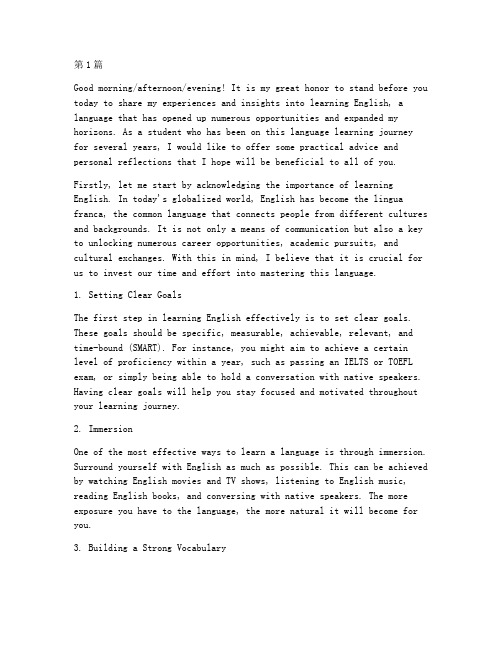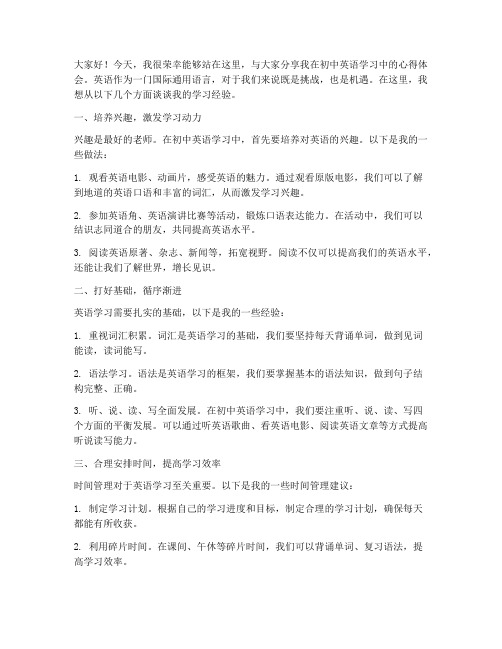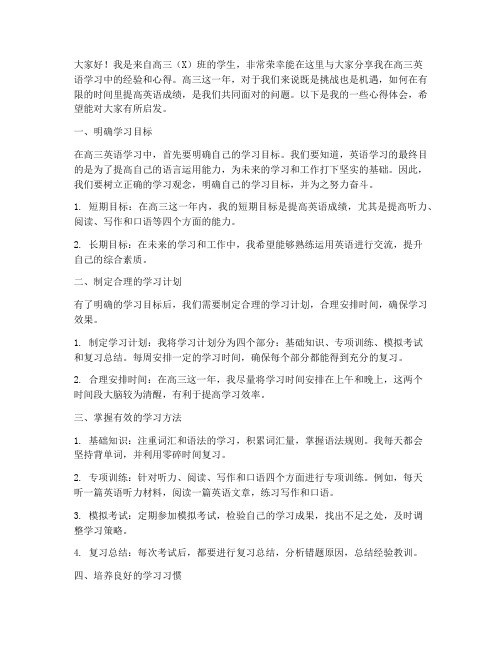英语学习经验交流发言稿
英语学习经验交流会发言稿范文

英语学习经验交流会发言稿英语学习经验交流会发言稿范文在现在的社会生活中,发言稿对我们的作用越来越大,发言稿可以帮助发言者更好的表达。
为了让您在写发言稿时更加简单方便,下面是小编为大家收集的英语学习经验交流会发言稿范文,欢迎阅读与收藏。
英语学习经验交流会发言稿1亲爱的同学们:大家好。
期中考试刚刚过去,经过这一段时间的学习,相信同学们已经查漏补缺,认识到了自己的不足。
转眼间,还剩下一个多月的学习时间,初一生活就将向我们挥手告别。
我们要利用这一个多月的时间,把初一画上一个完美的句号,为今后更加繁重的学习任务打下坚实的基础。
对于绝大多数同学来说,英语始终是心头大患。
我与大家经历相同,从4年级便被扣上了这顶帽子,每一次考试,英语总是给我拖后腿,但在一次次摸索中,我也在不断进步,总结了一些经验。
正所谓“方向不对,努力白费”,正确的学习方法会使我们的学习效率大大提高,从而达到事半功倍的目的。
下面是我总结的一些学习英语的经验,希望可以供同学们参考。
第一,做好课堂笔记。
顾名思义,课堂笔记便是利用课堂时间将老师所讲的重点、难点、疑点记下,千万不可以“手懒”,对于知识零碎的英语来说更是如此,好记性不如烂笔头。
然后是回顾笔记,回顾笔记才是做笔记的重点,建议大家,周末时专门抽出时间回顾一下当周所做的笔记,这样能有效地缓解紧张的心理,可以让你在下一周的学习中得心应手。
举个我自己的例子吧,记得有一次英语抽测,我抱着侥幸的心理,没有做好复习工作,所以考试前就开始临时抱佛脚,结果到了最后,根本没有时间复习完,考试时慌慌张张,考得一塌糊涂。
所以说,做好笔记对于学生来说十分重要。
第二,整理回顾错题。
对于很多同学来说,都能做到整理错题,但重点是我们不仅仅要整理,更要回顾与反思。
所谓“好马不吃回头草”对我们学生万万不可适用,要想成功挤过中考这座独木桥,就必须回顾自己的错题,也防止再出现类似的失误。
再举个例子吧,我开始和很多同学一样只是纠一下错,之后就不管了,但是有一次考试,我真记得做过某一题,就是忘了怎么做,结果不仅没做出题,心情也糟糕透顶,考试结果可想而知惨不忍睹,后来我学着经常回顾错题本,慢慢地积累,厚积薄发,考试也不再出现类似的失误。
英语优秀学生分享经验发言稿简短

英语优秀学生分享经验发言稿简短Ladies and Gentlemen,Good afternoon! It's an honor to stand here and sharemy experience in learning English with all of you.Firstly, I believe that a solid foundation is essential. This means mastering the basics of grammar, vocabulary, and pronunciation. Without a strong foundation, it's difficultto build upon and progress in the language. Regularpractice and revision are key to solidifying this foundation.Secondly, immersion in the language is crucial. Watching English movies, listening to English music,reading books and newspapers in English, and participatingin conversations with native speakers are all excellent ways to immerse oneself in the language. These activities not only enhance our listening and reading skills but also improve our speaking and writing abilities.Moreover, I find that setting goals and tracking progress helps keep me motivated. Whether it's aiming for a high score on an exam, achieving fluency in conversation,or understanding a complex text, having clear goals gives me a sense of direction and accomplishment.Lastly, I believe that enjoying the process of learning English is vital. Language learning can be fun and exciting, especially when we approach it with an open mind and a willingness to explore new cultures and ideas. Finding ways to make learning enjoyable, such as through games, quizzes, or language exchange partners, can make the journey more rewarding.In conclusion, my experience has taught me thatlearning English requires dedication, immersion, goal-setting, and a love for the language itself. I hope these tips will be helpful to you in your English learning journey.Thank you for listening.尊敬的各位老师,亲爱的同学们:大家好!非常荣幸能够站在这里与大家分享我的英语学习经验。
英语经验交流学生发言稿(3篇)

第1篇Good morning/afternoon/evening! It is my great honor to stand before you today to share my experiences and insights into learning English, a language that has opened up numerous opportunities and expanded my horizons. As a student who has been on this language learning journeyfor several years, I would like to offer some practical advice and personal reflections that I hope will be beneficial to all of you.Firstly, let me start by acknowledging the importance of learning English. In today's globalized world, English has become the lingua franca, the common language that connects people from different cultures and backgrounds. It is not only a means of communication but also a key to unlocking numerous career opportunities, academic pursuits, and cultural exchanges. With this in mind, I believe that it is crucial for us to invest our time and effort into mastering this language.1. Setting Clear GoalsThe first step in learning English effectively is to set clear goals. These goals should be specific, measurable, achievable, relevant, and time-bound (SMART). For instance, you might aim to achieve a certain level of proficiency within a year, such as passing an IELTS or TOEFL exam, or simply being able to hold a conversation with native speakers. Having clear goals will help you stay focused and motivated throughout your learning journey.2. ImmersionOne of the most effective ways to learn a language is through immersion. Surround yourself with English as much as possible. This can be achieved by watching English movies and TV shows, listening to English music, reading English books, and conversing with native speakers. The more exposure you have to the language, the more natural it will become for you.3. Building a Strong VocabularyA strong vocabulary is the foundation of effective communication in any language. Make it a habit to learn new words every day, and try to incorporate them into your daily conversations and writings. Use flashcards, vocabulary apps, and even write down new words in a notebook to reinforce your memory. Additionally, try to learn collocations, which are words that commonly go together, as this will help you speak and write more fluently.4. Grammar and PronunciationGrammar and pronunciation are two essential components of English proficiency. Invest time in understanding the basics of grammar, such as tenses, sentence structures, and parts of speech. As for pronunciation, practice listening to native speakers and try to mimic their accent and intonation. You can also record yourself speaking and compare it to the native speakers' recordings to identify areas for improvement.5. Engage in Conversational PracticeConversational practice is crucial for mastering a language. Find language exchange partners or join language clubs to practice speaking with others. Do not be afraid to make mistakes; they are a natural part of the learning process. The more you practice, the more confident you will become in your conversational abilities.6. Utilize TechnologyIn this digital age, technology can be a powerful tool in your language learning journey. There are numerous online resources, such as language learning apps, websites, and forums, that can help you supplement your studies. Additionally, consider using a language learning software or an online tutor to tailor your learning experience to your specific needs.7. Stay Patient and PersistentLearning a language is a gradual process that requires patience and persistence. Do not get discouraged by setbacks or slow progress. Remember that every bit of effort you put into learning English will contribute to your overall proficiency.8. Reflect and AdjustRegularly reflect on your learning process and make adjustments as needed. Assess your strengths and weaknesses, and focus on areas that require improvement. Set new goals based on your progress and continue to challenge yourself.In conclusion, learning English can be a challenging but rewarding experience. By setting clear goals, immersing yourself in the language, building a strong vocabulary, mastering grammar and pronunciation, engaging in conversational practice, utilizing technology, staying patient and persistent, and reflecting on your progress, you will be well on your way to achieving your language learning goals.Thank you for your attention, and I wish you all the best on your English learning journey. Let us continue to support and inspire each other as we strive to become proficient speakers and users of this beautiful language.Thank you.第2篇Good morning/afternoon! It is a great honor to stand before you today to share my experiences and insights into learning English. As a student who has been on a journey to master this beautiful language, I have encountered numerous challenges and rewards along the way. I hope that my experiences can inspire and guide others who are also striving to improve their English skills.Title: My Journey to English MasteryIntroduction:My name is [Your Name], and I am a [Your Current Level of Study – e.g., senior in high school]. My journey with English began when I was in elementary school, and it has been a continuous and challenging process. Today, I would like to share some of the key strategies, resources, and experiences that have helped me in my English learning journey.1. Embracing the Language:The first step in learning any language is to embrace it wholeheartedly. For me, this meant immersing myself in English as much as possible. I started by watching English movies with subtitles, listening to English music, and reading books in English. These activities not only helped me get familiar with the language but also sparked my interest in it.2. Building a Strong Foundation:A solid foundation is crucial for language learning. I focused on mastering the basics of grammar, vocabulary, and pronunciation. I took regular grammar lessons, used vocabulary apps, and practiced speaking with native speakers to improve my pronunciation. It was challenging at first, but with persistence, I gradually saw improvements.3. Utilizing Various Resources:There are numerous resources available to help learners improve their English skills. I made the most of these resources to enhance my learning. Here are some of the tools I found helpful:a. Textbooks and Workbooks: These are essential for structured learning. I used textbooks for grammar and vocabulary and workbooks for exercises and practice.b. Online Platforms: Websites like Duolingo, BBC Learning English, and Coursera offer interactive lessons and courses that cater to different levels of learners.c. Language Exchange Apps: Apps like Tandem and HelloTalk allow you to connect with native speakers and practice speaking through text, voice, and video chats.d. Podcasts and Audiobooks: Listening to podcasts and audiobooks helps improve listening skills and exposes you to different accents and speaking styles.4. Engaging in Conversational Practice:One of the most effective ways to improve your English is by engaging in conversations. I joined language clubs at school, participated in English-speaking groups, and even traveled to English-speaking countries to practice my speaking skills. These experiences helped me build confidence and improve my fluency.5. Setting Realistic Goals:Setting achievable goals is essential to keep you motivated and focused.I set short-term and long-term goals for myself, such as learning a new word every day, reading a book in English every month, and participating in an English-speaking competition.6. Overcoming Challenges:Learning a new language is not without its challenges. I faceddifficulties such as frustration with pronunciation, fear of making mistakes, and lack of motivation. However, I overcame these challenges by seeking help from teachers, joining support groups, and reminding myself of the reasons why I wanted to learn English.7. Reflecting and Adapting:As I progressed in my language learning journey, I reflected on my experiences and made necessary adjustments. I realized that what worked for me in the beginning might not work as effectively later on. Therefore, I was open to trying new methods and resources to keep my learning dynamic and engaging.Conclusion:In conclusion, my journey to English mastery has been a blend of hard work, determination, and continuous learning. By embracing the language, building a strong foundation, utilizing various resources, engaging in conversational practice, setting realistic goals, overcoming challenges, and reflecting on my experiences, I have been able to improve my English skills significantly.I believe that every student has the potential to achieve their language learning goals. It is important to be patient, persistent, and open tonew experiences. As you embark on your own English learning journey, remember that success is a result of continuous effort and dedication.Thank you for listening to my experiences. I hope my words have inspired you to take the first step towards mastering English and to enjoy the journey as much as I have.[Your Name]第3篇Good morning/afternoon/evening! It is a great pleasure to stand before you today to share my experiences and insights on learning English, a language that has become an integral part of my life. As a student who has been studying English for several years, I have gathered a wealth of knowledge and practical skills that I would like to pass on to my fellow learners. So, let's embark on this journey of discovery and exchange.First and foremost, I want to emphasize the importance of setting clear goals. When I first started learning English, I was motivated by the desire to communicate effectively with native speakers and to explore the world beyond my own language. It is crucial to define your objectives and understand why you want to learn the language. Whetherit's for academic purposes, career advancement, or personal fulfillment, having a clear goal will keep you motivated and focused.One of the most effective ways to improve your English is through reading. I have always believed that reading is the key to language mastery. It not only exposes you to new vocabulary and sentence structures but also helps you understand the nuances of the language. I recommend starting with simple books and gradually moving to more complex materials. Additionally, reading a variety of genres, such as novels, newspapers, and scientific articles, can broaden your understanding of the language and culture.Listening is another essential skill that requires constant practice. I found that listening to English podcasts, watching movies and TV shows, and listening to music in English were great ways to immerse myself in the language. It is important to listen to different accents anddialects, as this will help you adapt to various speaking styles. Moreover, try to listen actively by taking notes, summarizing the content, and discussing it with others. This will enhance your comprehension and retention of the language.Writing is often overlooked, but it is a fundamental skill that can greatly improve your English. I started by keeping a daily journal in English, which helped me practice my grammar and vocabulary. Writing essays, articles, and even short stories can also be beneficial. It is essential to proofread and edit your work, as this will help youidentify and correct your mistakes. Remember, writing is a skill that improves with practice, so don't be afraid to make mistakes and learn from them.Speaking, of course, is the ultimate goal of language learning. I found that joining language exchange groups, participating in debate clubs, and attending English-speaking events were excellent opportunities to practice my speaking skills. It is important to speak as much as possible, even if it feels uncomfortable at first. Try to find a language partner or join a conversation class, where you can practice with others. Don't worry about making mistakes; what matters most isthat you are trying to communicate and improving your fluency.Another crucial aspect of learning English is to embrace the language and culture. I have always been fascinated by the English-speaking world and its diverse cultures. By immersing myself in the culture, I have been able to understand the language better and appreciate its nuances. Follow English-speaking influencers on social media, watch English movies and TV shows, and explore the music scene. This will not only make your language learning journey more enjoyable but also help you connect with people from different backgrounds.Moreover, I want to share some tips that have helped me along the way:1. Be consistent: Language learning requires regular practice, so try to set aside time each day to study and practice English.2. Be patient: Improvement takes time, so don't get discouraged if you don't see immediate results.3. Stay positive: Maintain a positive attitude and believe in your abilities. Confidence is key to success.4. Utilize technology: There are numerous language learning apps and online resources that can help you improve your English.5. Seek feedback: Don't hesitate to ask for help from teachers, mentors, or language partners. Constructive criticism is invaluable.In conclusion, learning English has been a transformative experience for me. It has opened up new opportunities, enriched my life, and allowed me to connect with people from all over the world. I hope that my experiences and advice will inspire and motivate you to pursue your language learning journey with enthusiasm and determination.Thank you for your attention, and I wish you all the best in your English language learning endeavors.[Your Name]。
初中英语学生经验交流发言稿

大家好!今天,我很荣幸能够站在这里,与大家分享我在初中英语学习中的心得体会。
英语作为一门国际通用语言,对于我们来说既是挑战,也是机遇。
在这里,我想从以下几个方面谈谈我的学习经验。
一、培养兴趣,激发学习动力兴趣是最好的老师。
在初中英语学习中,首先要培养对英语的兴趣。
以下是我的一些做法:1. 观看英语电影、动画片,感受英语的魅力。
通过观看原版电影,我们可以了解到地道的英语口语和丰富的词汇,从而激发学习兴趣。
2. 参加英语角、英语演讲比赛等活动,锻炼口语表达能力。
在活动中,我们可以结识志同道合的朋友,共同提高英语水平。
3. 阅读英语原著、杂志、新闻等,拓宽视野。
阅读不仅可以提高我们的英语水平,还能让我们了解世界,增长见识。
二、打好基础,循序渐进英语学习需要扎实的基础,以下是我的一些经验:1. 重视词汇积累。
词汇是英语学习的基础,我们要坚持每天背诵单词,做到见词能读,读词能写。
2. 语法学习。
语法是英语学习的框架,我们要掌握基本的语法知识,做到句子结构完整、正确。
3. 听、说、读、写全面发展。
在初中英语学习中,我们要注重听、说、读、写四个方面的平衡发展。
可以通过听英语歌曲、看英语电影、阅读英语文章等方式提高听说读写能力。
三、合理安排时间,提高学习效率时间管理对于英语学习至关重要。
以下是我的一些时间管理建议:1. 制定学习计划。
根据自己的学习进度和目标,制定合理的学习计划,确保每天都能有所收获。
2. 利用碎片时间。
在课间、午休等碎片时间,我们可以背诵单词、复习语法,提高学习效率。
3. 合理安排课外活动。
课外活动不仅可以丰富我们的课余生活,还能帮助我们放松心情,提高学习效率。
四、积极参与课堂,提高课堂效率课堂是学习英语的重要场所,以下是我的一些课堂学习建议:1. 专心听讲。
在课堂上,我们要认真听老师讲解,做好笔记,及时巩固所学知识。
2. 积极参与课堂活动。
在课堂上,我们要勇于发言,大胆表达自己的观点,提高口语表达能力。
学生分享英语经验发言稿范文

大家好!我是XX班的学生XX,今天我很荣幸能在这里与大家分享我的英语学习经验。
首先,我想说的是,学习英语并不是一蹴而就的事情,需要我们持之以恒的努力。
以下是我总结的一些学习英语的经验,希望能对大家有所帮助。
一、培养兴趣兴趣是最好的老师。
对于英语学习,我们要培养自己的兴趣。
可以通过观看英文电影、听英文歌曲、阅读英文书籍等方式,让英语学习变得有趣。
同时,多与英语母语者交流,了解他们的文化,也能激发我们学习英语的热情。
二、制定计划学习英语需要有计划地进行。
我们可以根据自己的实际情况,制定一个切实可行的学习计划。
例如,每天背10个单词,每周读一篇英文文章,每月看一部英文电影等。
坚持按照计划执行,逐步提高自己的英语水平。
三、扩大词汇量词汇是英语学习的基础。
我们要注重积累词汇,扩大词汇量。
可以通过以下方法来积累词汇:1. 制作单词卡片:将单词写在卡片上,正面写单词,背面写释义和例句。
每天翻看卡片,加深记忆。
2. 阅读英文文章:在阅读过程中,遇到不认识的单词,及时查阅词典,并记录下来。
平时多复习,巩固记忆。
3. 制作词汇笔记:将学习过程中遇到的易混淆、易忘记的单词,整理成笔记,定期复习。
四、提高听力水平听力是英语学习的重要组成部分。
我们可以通过以下方法提高听力水平:1. 每天坚持听英语听力材料,如英语广播、英语新闻、英语演讲等。
2. 多观看英文电影、电视剧,提高对英语语音、语调的敏感度。
3. 积极参加英语角、英语沙龙等活动,与英语母语者进行交流。
五、加强口语练习口语是英语学习的难点。
我们要勇于开口说英语,加强口语练习。
以下是一些建议:1. 每天模仿英语母语者的发音,提高自己的口语水平。
2. 多与同学、老师进行英语对话,提高口语交流能力。
3. 参加英语演讲、辩论等活动,锻炼自己的口语表达能力。
总之,学习英语需要我们付出努力,坚持不懈。
希望我的经验能对大家有所启发。
最后,祝愿大家在英语学习的道路上越走越远,取得优异的成绩!谢谢大家!。
学英语的经验发言稿初中怎么写范文

学习英语的经验发言稿篇
大家好,今天我很荣幸可以来分享我的学习英语的经验。
英语是一门世界语言,掌握好英语对我们的未来发展至关重要。
下面我将分享一些我在初中时学习英语的经验和方法。
首先,要建立良好的学习习惯。
每天都要抽出一定的时间来学习英语,坚持不
懈地学习是很重要的。
比如,可以每天晚上抽出半个小时来背单词,每天早上花一些时间听英语歌曲或者新闻,多听多说对提高英语听力和口语能力是很有帮助的。
其次,要充分利用各种学习资源。
除了老师讲授的知识,还可以利用网络资源
来拓展自己的英语知识。
可以在网上找一些英语学习网站或者APP,比如英语课程、英语听力练习等,这样可以更好地巩固和提高自己的英语水平。
另外,多参加英语学习活动也是提高英语水平的好方法。
可以参加学校组织的
英语角活动、英语演讲比赛等,这样可以锻炼自己的口语表达能力,提高自信心。
还可以和同学们一起组织英语学习小组,互相学习、互相交流,这样可以更快地提高英语水平。
最后,要保持乐观的心态。
学习英语是一个长期的过程,会遇到各种困难和挫折,但是只要坚持下去,一定会取得进步。
要相信自己,相信自己的能力,勇敢地面对挑战,相信只要努力,一定能学好英语。
总之,学习英语是一个持之以恒的过程,需要不断地学习和努力。
希望大家都
能在学习英语的路上取得成功,感谢大家听我分享我的经验,谢谢!。
中学英语经验交流会发言稿

中学英语经验交流会发言稿
尊敬的老师们,亲爱的同学们:
大家好!我很荣幸能在这次中学英语经验交流会上发言。
我是一名中学英语爱好者,
今天我想分享一些我个人的学习经验和方法。
首先,我认为提高英语的关键是多听、多说、多读和多写。
在学习英语的过程中,不
仅要注重课堂上的听说训练,也要积极参加英语角和英文演讲活动,培养自己的英语
口语表达能力。
另外,阅读英文原著和英语报纸杂志也是提高英语水平的重要途径。
通过阅读,我们可以了解不同的语法结构和词汇用法,提升对英语的理解和运用能力。
其次,记忆和复习也是学习英语的重要环节。
记忆英语单词是英语学习的基础,可以
通过制作单词卡片、使用记忆软件等方式来加强记忆。
而复习则是巩固所学知识的关键。
可以通过做一些练习题和模拟试题来检查自己的掌握程度,及时发现问题并加以
解决。
此外,培养学习英语的兴趣也是非常重要的。
我们可以通过看英语电影、听英语歌曲、参加英语俱乐部等方式,让学习英语变得有趣而富有挑战性。
同时,我们可以找一些
英语学习的小伙伴,互相帮助、互相鼓励,共同进步。
最后,学习英语是一个长期而又不断探索的过程。
我们要保持持之以恒的学习态度和
积极的学习心态,相信自己的能力,并不断挑战自己的极限。
谢谢大家!我相信,只要我们坚持不懈,努力学习,我们一定能够在英语学习的道路
上大有所成!让我们一起共同努力,一同成长!谢谢!。
高三英语经验交流研讨发言稿

大家好!我是来自高三(X)班的学生,非常荣幸能在这里与大家分享我在高三英语学习中的经验和心得。
高三这一年,对于我们来说既是挑战也是机遇,如何在有限的时间里提高英语成绩,是我们共同面对的问题。
以下是我的一些心得体会,希望能对大家有所启发。
一、明确学习目标在高三英语学习中,首先要明确自己的学习目标。
我们要知道,英语学习的最终目的是为了提高自己的语言运用能力,为未来的学习和工作打下坚实的基础。
因此,我们要树立正确的学习观念,明确自己的学习目标,并为之努力奋斗。
1. 短期目标:在高三这一年内,我的短期目标是提高英语成绩,尤其是提高听力、阅读、写作和口语等四个方面的能力。
2. 长期目标:在未来的学习和工作中,我希望能够熟练运用英语进行交流,提升自己的综合素质。
二、制定合理的学习计划有了明确的学习目标后,我们需要制定合理的学习计划,合理安排时间,确保学习效果。
1. 制定学习计划:我将学习计划分为四个部分:基础知识、专项训练、模拟考试和复习总结。
每周安排一定的学习时间,确保每个部分都能得到充分的复习。
2. 合理安排时间:在高三这一年,我尽量将学习时间安排在上午和晚上,这两个时间段大脑较为清醒,有利于提高学习效率。
三、掌握有效的学习方法1. 基础知识:注重词汇和语法的学习,积累词汇量,掌握语法规则。
我每天都会坚持背单词,并利用零碎时间复习。
2. 专项训练:针对听力、阅读、写作和口语四个方面进行专项训练。
例如,每天听一篇英语听力材料,阅读一篇英语文章,练习写作和口语。
3. 模拟考试:定期参加模拟考试,检验自己的学习成果,找出不足之处,及时调整学习策略。
4. 复习总结:每次考试后,都要进行复习总结,分析错题原因,总结经验教训。
四、培养良好的学习习惯1. 保持良好的作息时间:保证充足的睡眠,有助于提高学习效率。
2. 合理安排饮食:保持健康的饮食习惯,有助于提高身体素质,为学习提供能量。
3. 增强心理素质:面对高考的压力,我们要学会调整心态,保持乐观的心态,相信自己。
- 1、下载文档前请自行甄别文档内容的完整性,平台不提供额外的编辑、内容补充、找答案等附加服务。
- 2、"仅部分预览"的文档,不可在线预览部分如存在完整性等问题,可反馈申请退款(可完整预览的文档不适用该条件!)。
- 3、如文档侵犯您的权益,请联系客服反馈,我们会尽快为您处理(人工客服工作时间:9:00-18:30)。
英语学习经验交流发言稿
很荣幸今天能站在这里跟大家交流一下英语学习经验。
我的一些情况刚才主持人已经说过了,就不再重复了。
直接进入正题吧。
现在既然大家坐在这里,说明大家还是对大学阶段的英语学习有一定规划的,至少是有一些想法要提高自己的英语水平吧。
我去年这个时候,基本上什么都不知道,对英语怎么继续学习也比较茫然,不知道你们现在有没有这个感觉。
现在先说一些我在大一时的英语学习经历吧。
我是分在三级班,班里的同学一般英语都很强。
读写课还行,听说课曾让我郁闷了很长时间,几乎每次上听说就很紧张。
因为我课上比较沉默,不爱发言,正好跟听说课的主旨相悖。
我的口语发音还行,就是感觉英式思维不是很敏捷,总担心对话时答不上来,脑子一片空白怎么办。
记得当时对比挺明显的,班上很多同学课上表现非常积极,给我压力很大。
但是,压力归根结底还是要化为动力嘛。
我就每天起很早,去操场晨读。
有句话叫笨鸟先飞,我基本上就是这种类型的,我把上课要讨论的话题先自己说一遍,上课的时候就反应比较快了。
有一点好处,应对老师突然点名很有效。
不过有的人说这样是不是有点假。
但是我觉得,还是在于你怎么看这个问题。
你花了时间,自己开动了脑筋,锻炼了自己的英式思维和逻辑思维,这个过程是在课堂还是课下,应该没有多大的区别吧,最重要的不还是你自己的speaking得到提高了吗。
说到晨读,我必须要告诉你们一个好消息,习惯晨读的同学加了英协可算是找对组织了。
每天都有集体晨读还有权威人士领读呢,这一点真的很好。
大部分同学应该跟我差不多,英语学了六年,几乎不放假的话每天早晨都有至少半个小时的晨读时间吧。
你看现在,晨读的人很少,大家也会慢慢的丢了这个对英语学习非常有益的好习惯,真的很可惜。
我的英语基本上是读出来的,我从来不去抄什么单词,或者大量的做英语题,我就是读。
读的过程中,培养语感是肯定的,还有单词啊,在语境中记单词我认为是最好的方法。
就这样一直坚持着,自己课下多下一点功夫,课上老师要求怎么做就很认真的去做,也很好的利用了网上的学习资源。
不知道你们现在英语课上过机了没有。
个人认为视听说教程的outside view, listening in还有unit test质量是相当高的。
你们可以去听课外的BBC,VOA,听地道英语,但一定不要忽视了我们已经有的学习资源,一定要好好利用。
我虽然偶尔也会偷个懒,尤其是天冷了以后就不怎么晨读了,但是英语学习也没有忽视。
这样,我的大一上学期就在对听说课的紧张和恐惧中度过了,不过期末考试包括口语考试成绩还挺好。
应该是有一定收效吧。
下学期,开学不久有一个全国大学生英语竞赛。
先是初赛,没怎么准备,因为当时觉得这比赛那么大自己也就是试一试。
没想到获了一等奖,咱这个校区是有12个人,可以参加复赛。
复赛分口试和笔试。
当时看到口试我很无语,但既然已经有了这个机会怎么也得拼一下吧。
我就每天早晨背四级口语考试题,穿插着再读读读写课的课文,记记单词,一直坚持到复试结束。
复试之后获得特等奖。
这个特等奖对我来说挺
重要的。
因为在综合测评里面素质发展分决定最终获奖名次。
我去年虽然是学习成绩第一,但是如果没有这六分,国家奖学金竞争就激烈多了。
你看关键时刻英语还是相当重要的。
还有以后的考研、出国啊,都非常重要,再想远一点,就是以后工作了,还是对英语有要求。
所以现在不能把对英语的要求降低,没有像高中一样那么紧张的学习,就严格要求自己,不要等到那些高中的底子用的差不多了不够用了,才知道应该早早地重视英语。
有一个常被人提起的现象,就是大学英语水平还比不上高考之前。
如果到了这个地步,就应该好好反思反思了。
这个学期,我要考六级了,现在还没有开始准备,不过也得抓紧了。
词汇量需要扩充不少。
我刚在图书馆借了几本六级的书,晨读计划估计又要开始了。
这些大概就是我的英语学习情况了。
我没从听说读写这些方面一个一个的说,感觉作为一个大二的学生,那些方法肯定说的也不专业不权威,就是简单的讲了讲我前一年英语学习的历程。
这些你们也是要经历的。
我只希望你们能从我的经历中吸取些经验教训,然后好好地去规划自己的英语学习,毕竟每个人的学习方法学习态度都不一样。
最后祝愿你们在英协获得理想的进步!谢谢
英语学习经验交流发言稿 [篇2]
亲爱的同学们:
大家好,。
期中考试刚刚过去,经过这一段时间的学习,相信同学们已经查漏补缺,认识到了自己的不足。
转眼间,还剩下一个多月的学习时间,初一生活就将向我们挥手告别。
我们要利用这一个多月的时间,把初一画上一个完美的句号,为今后更加繁重的学习任务打下坚实的基础。
对于绝大多数同学来说,英语始终是心头大患。
我与大家经历相同,从4年级便被扣上了这顶帽子,每一次考试,英语总是给我拖后腿,但在一次次摸索中,我也在不断进步,总结了一些经验。
正所谓“方向不对,努力白费”,正确的学习方法会使我们的学习效率大大提高,从而达到事半功倍的目的。
下面是我总结的.一些学习英语的经验,希望可以供同学们参考。
第一,做好课堂笔记。
顾名思义,课堂笔记便是利用课堂时间将老师所讲的重点、难点、疑点记下,千万不可以“手懒”,对于知识零碎的英语来说更是如此,好记性不如烂笔头。
然后是回顾笔记,回顾笔记才是做笔记的重点,建议大家,周末时专门抽出时间回顾一下当周所做的笔记,这样能有效地缓解紧张的心理,可以让你在下一周的学习中得心应手。
举个我自己的例子吧,记得有一次英语抽测,我抱着侥幸的心理,没有做好复习工作,所以考试前就开始临时抱佛脚,结果到了最后,根本没有时间复习完,考试时慌慌张张,考得一塌糊涂。
所以说,做好笔记对于学生来说十分重要。
第二,整理回顾错题,对于很多同学来说,都能做到整理错题,但重点是我们不仅仅要整理,更要回顾与反思。
所谓“好马不吃回头草”对我们学生万万不可适
用,要想成功挤过中考这座独木桥,就必须回顾自己的错题,也防止再出现类似的失误。
再举个例子吧,我开始和很多同学一样只是纠一下错,之后就不管了,但是有一次考试,我真记得做过某一题,就是忘了怎么做,结果不仅没做出题,心情也糟糕透顶,考试结果可想而知惨不忍睹,后来我学着经常回顾错题本,慢慢地积累,厚积薄发,考试也不再出现类似的失误。
第三,要利用零碎的时间。
英语是一门需要长期积累的科目,知识点很多,一定要好好利用互联网、学习机和其他移动方便的设备,更不用说书籍和杂志这样的传统学习资源!你完全可以在课间、排队、午休等时间记几个单词,要养成“天天英语”的习惯,每天按老师的要求作一篇完形阅读,坚持天天听英语。
其实学英语的过程更像是一朵云的形成,是水汽的一点点积累;而不像砌一面墙那样,把砖堆上去就好。
以上就是我的一点学习英语的经验,希望同学们能取之精华。
最后告诉大家,心动不如行动。
希望同学们要为之付出努力,且要持之以恒,临渊羡鱼不如退而结网,祝愿你们努力拼搏,实现自己心中的梦想!
谢谢大家!。
